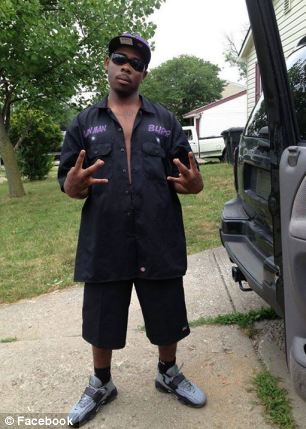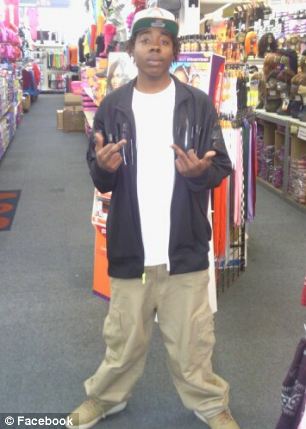They Only Needed Mentors
April 15, 2014
IN the wake of the Nathan Trapuzzano murder, a woman whose husband was also recently murdered by black teens in Indianapolis (not that it’s a trend or anything) has called on men to mentor young black boys to prevent brutal crimes, reports The Daily Mail.
Sgt. First Class Jim Vester, 32, of the Indiana National Guard was killed in Indianapolis in December after arranging to buy an iPad via Craigslist. His body was left in a parking lot. Vester had a one-year-old son and was married.
His wife, Jamie, told Fox News this week:
“I’m really calling out to the males to get out there and mentor those boys and maybe we could prevent some of this violence. Every single person could use somebody to love them and be there for them.”


— Comments —
CT writes:
Mentors is a good idea, but for the most part the only thing that truly works is swift, violent justice. Barbarianism can only be countered with more extreme acts of barbarism.
Public canings, as they do in Thailand and Malaysian would be the best counter to such ignorant thugs. Before they kill someone, they usually perform more minor infractions such as car theft, assault and robberies. It’s at this point that they should be caned publicly in the neighborhood they live in for all to see. I guarantee you, if this were done, violent crime by all teens, not just blacks, would dwindle down to nothing. Fear is a great deterrent. Unfortunately, we are “to civilized” and evolved to regress to such acts… that are effective.
Given that most perpetrators are indeed black, this rudimentary idea would be labeled as racist.
Therefore, crimes like these will continue.
Laura writes:
I entirely agree with you, although I wouldn’t characterize harsh punishment as barbaric. It’s simply normal justice. And I agree mentorship is a good idea, but it cannot replace justice and cannot solve a problem that is at least partly due to a lack of justice.
These crimes, I believe, could be drastically reduced in a very short period.
They could be curtailed by serious corporal punishment and harsh, miserable conditions in detention for gun violations, drug trafficking, theft and other lesser infractions; the death penalty, after swift and fair trial, for murder and perhaps other violent offenses such as armed robbery; and castration, immediately after swift and fair trial, for those convicted of rape.
But all that would reek of white authority and oppression, even if white criminals were subjected to the exact same penalties, which they should be. It’s all inconceivable now because criminals are considered victims of their environment. That’s exactly what Jamie Vester is suggesting here, that these boys were victims. They may have been victims in some ways, but their victimhood is nothing compared to that of their victims and nothing in their childhoods justifies what they did.
Sage McLaughlin writes:
So instead they call for young blacks to be mentored, presumably by white men, as if there’s any reason to believe that white mentors could possibly make up for what is lacking in the black family in America.
Sheila C. writes:
I long ago ceased trying to comprehend those whites who seem to passively assent to their civilization’s destruction. What I cannot begin to fathom, however, are those whites who seem to care less for their loved ones than for those loved ones’ black murderers. Nathan Trapuzzano is hardly in his grave, and his widow is lamenting his poor, fatherless black killer. Jamie Vester, too, is apparently less concerned with her own, fatherless daughter than with the “fatherless” blacks who slaughtered her husband. I find myself wondering, in this perverted reality, if perhaps I’m not truly a Christian, despite my faith in Christ . . . for I cannot summon any pity for the murderers, and reserve my forgiveness for those who’ve at least made the appearance of repenting of their crimes. Even those, however, deserve decent society’s just punishment.
While the capering black savages are a different subspecies from my own; the pathetic white women who weep over them are equally alien to me.
A reader writes:
As has been mentioned before, dysfunction will flourish as long as the government rewards dysfunction, specifically with payments to women for having children out-of-wedlock.
Laura writes:
It should be remembered when talking about the high illegitimacy rate among blacks — some 70 percent are born out of wedlock — that this does not mean that this same percentage of children has no contact with their fathers. Simeon Adams, who killed Nathan Trapuzzano, knew his father. Before he was born, his father had served at least one of his two prison sentences. Would it have been better if he had lived with his criminal father? I don’t know. He did spend a lot of time with an uncle. This male presence in his life did not keep him from a life of crime from the age of nine.
As far as the ending of welfare support for unmarried mothers, I think anyone who has common sense sees the harm this has done. However, ending welfare would not necessarily keep a high percentage of black women from financially supporting black men, fostering some of the same polygamous lifestyle. And while fatherlessness is a problem, it is not solely caused by welfare. If it were, whites would have a comparable rate of illegitimacy.
My point is that I don’t think raising marriage rates among blacks, as important ad it is, is a cure-all for crime and lawlessness.

